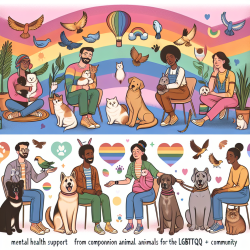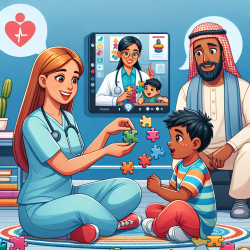In a world where LGBTQ+ individuals often face unique challenges, the role of social support and emotional comfort becomes crucial in mitigating the negative impacts of microaggressions. Recent research titled "The Moderating Effect of Comfort from Companion Animals and Social Support on the Relationship between Microaggressions and Mental Health in LGBTQ+ Emerging Adults" sheds light on this important topic.
The Impact of Microaggressions on Mental Health
LGBTQ+ individuals frequently encounter microaggressions—subtle, often unintentional discriminatory remarks or behaviors that can significantly affect mental health. These experiences contribute to heightened levels of depression and anxiety among LGBTQ+ emerging adults. As practitioners, understanding these dynamics is essential for providing effective support.
The Role of Social Support
Social support from family, friends, and community networks has long been recognized as a protective factor against the negative effects of microaggressions. The research highlights that high levels of human social support can buffer the impact of these stressors, reducing depressive symptoms significantly.
Companion Animals: An Untapped Resource
While human social support is vital, the study introduces an intriguing dimension—companion animals. Pets like dogs and cats offer unique emotional comfort that can moderate the relationship between microaggressions and depressive symptoms. This finding opens new avenues for practitioners to consider when developing holistic therapeutic approaches.
Implementing Research Outcomes in Practice
- Encourage Pet Ownership: For clients who express interest or already own pets, fostering a deeper bond with their companion animals can be encouraged as part of their mental health strategy.
- Integrate Animal-Assisted Therapy: Consider incorporating animal-assisted interventions into therapy sessions to enhance emotional well-being.
- Create Supportive Environments: Facilitate group sessions or workshops where clients can share experiences about their pets and how they help cope with stressors.
The Need for Further Research
This study underscores the complexity of human-animal interactions and their impact on mental health. While it highlights significant findings, it also points to areas needing further exploration. Longitudinal studies could provide deeper insights into how these relationships evolve over time and their long-term effects on mental health.
Encouraging Practitioners to Explore Further
- Dive Deeper into Human-Animal Interaction Studies: Practitioners are encouraged to stay updated with ongoing research in this field to refine their therapeutic approaches continually.
- Collaborate with Animal Behaviorists: Building partnerships with professionals specializing in animal behavior can enhance understanding and application of these insights in therapy.
- Participate in Conferences: Engage in conferences focusing on LGBTQ+ issues and animal-assisted therapy to network and learn from peers.
The findings from this research are a call to action for practitioners to embrace innovative methods that incorporate both human social support and companion animals into therapeutic practices. By doing so, they can offer more comprehensive care that addresses the multifaceted needs of LGBTQ+ individuals facing microaggressions.
To read the original research paper, please follow this link: The Moderating Effect of Comfort from Companion Animals and Social Support on the Relationship between Microaggressions and Mental Health in LGBTQ+ Emerging Adults.










